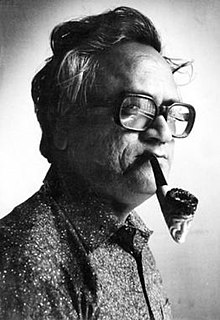Akhteruzzaman Elias
Akhteruzzaman Elias | |
|---|---|
 | |
| Native name | আখতারুজ্জামান ইলিয়াস |
| Born | 12 February 1943 Gotia, Gaibandha District, British Raj (now Bangladesh) |
| Died | 4 January 1997 (aged 53) |
| Occupation | novelist, short story writer, academician |
| Nationality | Bangladeshi |
| Education | Master of Arts |
| Alma mater | Bogra Zilla School Dhaka College University of Dhaka |
| Notable works | Khoabnama, Chilekothar Sepai |
| Notable awards | Bangla Academy Literary Award (1983) Ekushey Padak (1998) |
Akhteruzzaman Elias (12 February 1943 – 4 January 1997) (Bengali: আখতারুজ্জামান ইলিয়াস) was a Bangladeshi novelist and short story writer.[1] Despite writing only two novels, critics place Elias "in the pantheon of great Bengali novelists".[2] Elias "emerged as a powerful short-story writer"[3] in 1960s, and published his first novel, Chile Kotar Sepai in 1987 and his second and last Khowabnama in 1996 shortly before his death from cancer on 4 January 1997.[1]
Early life and education[]
Elias was born at his maternal uncle's home in Gotia village in Gaibandha District.[1] His paternal home was in Chelopara, near Bogra. His father, Badiuzzaman Muhammad Elias, was a member of the East Bengal Provincial Assembly and Parliamentary Secretary of the Muslim League.[1] Elias' mother's name was Mariam Elias.
Elias completed his Matriculation from Bogra Zilla School in 1958,[4] Intermediate from Dhaka College in 1960, and BA (Hons) and MA from the University of Dhaka in 1964.
Career[]
Elias started his career as a lecturer at Jagannath College and worked there till 1983.[1] He also worked subsequently as Deputy Director, Directorate of Primary Education, Vice-Principal of Music College, and Professor and Head of the Department of Bengali at Dhaka College.[1]
Death[]
On 13 of January, 1996, Akhteruzzaman Elias was diagnosed of cancer. Delayed identification of the disease caused his situation to deteriorate. On 20th March of the same year, his right leg, affected by cancer, had to be cut off from his body. Suffering for a few days, he finally breathed his last breath on 4th of January 1997 in Dhaka Community Hospital, Dhaka.
Works[]
Elias is said to not have focused on the quantity of his literary output, rather on the quality. His literary work includes themes such as the country's history, heritage, culture, politics, economics, poverty, exploitation, and deprivation. He is said to have tried to comprehend human life as a whole through these themes. Elias has been praised on his ability to portray subtle mental tendencies.
Below are listed his notable works.
Novels
- Chilekothar Sepai /চিলেকোঠার সেপাই (The Soldier in the Attic) (1987) - details the psychological journey of a man during the turbulent period of the mass uprisings of 1969, just prior to Bangladeshi independence in 1971. This novel also contains what is arguably the most authentic description of life in Puran Dhaka, the old and distinctive part of Dhaka.
- Khoabnama/খোয়াবনামা (The Saga of Dreams) (1996) - Khoabnama depicts the socio-political scene in rural pre-partition Bangladesh.
Short story collections
- Dojokher Om/ দোজখের ওম (The Warmth of Hell)
- Dudhbhate Utpat/ দুধভাতে উৎপাত (No Peace in Milk and Rice)
- Onno Ghore Onno Shor/ অন্য ঘরে অন্য স্বর (Another Tune in Another Room)
- Khoari/ খোয়ারি (Hangover)
- Jal Shopno, Shopner Jal/ জাল স্বপ্ন, স্বপ্নের জাল (Fake Dream, Illusion of Dream)
Essay collections
- Shongskritir Bhanga Shetu/ সংস্কৃতির ভাঙা সেতু (Broken Bridge of Culture)
Awards[]
- 1977 : Humayun Kabir Smrti Puraskar
- 1983 : Bangla Academy Literary Award in Literature
- 1987 : Alaol Sahitya Puraskar - Chilekothar Sepai
- 1996 : Ananda Puraskar - Khwabnama
- 1996 : Saadat Ali Akhand Puraskar - Khwabnama
- 1996 : Kazi Mahbubullah Gold Medal - Khwabnama
- 1999 : Ekushey Padak (posthumous)
References[]
- ^ a b c d e f Shafiul Alam (2012). "Elias, Akhteruzzaman". In Sirajul Islam and Ahmed A. Jamal (ed.). Banglapedia: National Encyclopedia of Bangladesh (Second ed.). Asiatic Society of Bangladesh.
- ^ Ekbal, Nikhat (2009). "Akhtaruzzaman Ilias". Great Muslims of Undivided India. Delhi: Kalpaz Publications. p. 270. ISBN 9788178357560. Retrieved 2 April 2018.
- ^ Maksud, Syed Abul (April 2007). "Bangla Literature in the Twentieth Century". History of Bangladesh (1704-1971) (3rd ed.). Dhaka: The Asiatic Society of Bangladesh. p. 273. ISBN 978-984-512-337-2.
- ^ Md.Mahbur Rahman (5 August 2006). "From Bogra : A Successful Seat of knowledge". The Daily Star. Retrieved 29 December 2015.
External links[]
- Bengali-language writers
- Bengali novelists
- Bangladeshi male novelists
- 1943 births
- 1997 deaths
- Dhaka College faculty
- Dhaka College alumni
- University of Dhaka alumni
- Recipients of Bangla Academy Award
- Recipients of the Ananda Purashkar
- Recipients of the Ekushey Padak
- 20th-century novelists
- People from Bogra District
- 20th-century Bangladeshi male writers
- People from Gaibandha District
- Pipe smokers